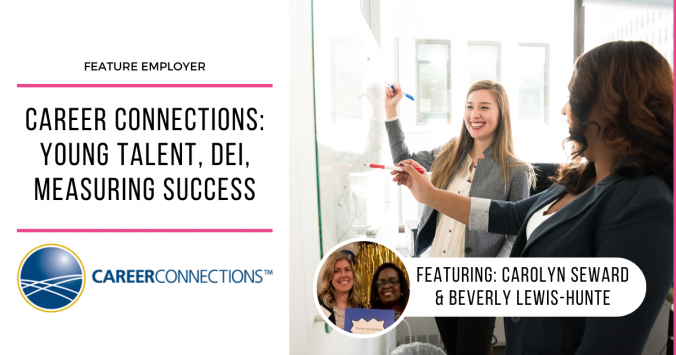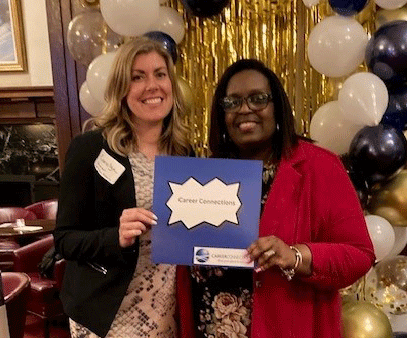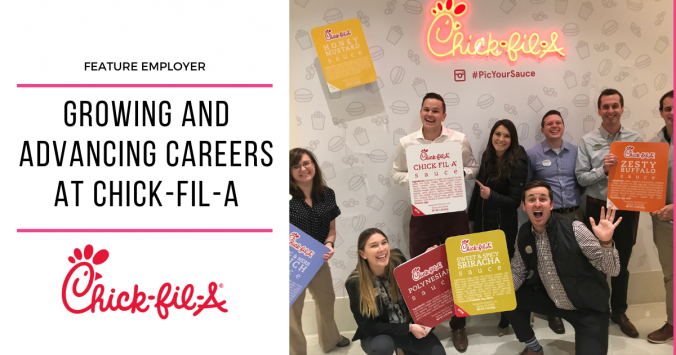An industry leader in the recruiting space, Career Connections knows the insurance marketplace inside and out. They serve as an external recruitment partner for companies. Career Connections assist in everything from discovering hidden talent to helping candidates prepare with resume reviews and mock interviews and learn more about the different career paths within the insurance industry.
TalentEgg was granted a wonderful opportunity to speak with Carolyn Seward and Beverly Lewis-Hunte from Career Connections, who graciously disclosed in-depth details relating to all things Insurance, events and growth in the sector. They also touch on opportunities for young talent, DEI, work models and measuring success within an ever changing industry.
Experience with Career Connections
Carolyn Seward, Manager & Beverly Lewis-Hunte, Senior Program Officer
We asked Carolyn and Beverly to share their experience working at Career Connections with us. They mention it is an exciting and unique workplace for various reasons. “Career Connections is an interesting program because we are recruiting for the property and casualty insurance industry as a whole, not just for a single employer! This involves creating awareness of the different career pathways that can vary quite a bit,” they stated.
They both touched on how the insurance industry has a lot of variety to offer, so there is something for everyone. Carolyn and Beverly say they face a challenge to connect this sentiment with young talent. They express the limitless room to grow in the industry, “insurance isn’t as well known of a career path so we have unlimited opportunity for growth and the insurance industry is very supportive of our work.”
Initiatives for Young Talent in the Industry
We spoke about the initiatives that Career Connections is implementing for students and new grads. While they have lots on the go, Carolyn and Beverly shared that their “Industry Days” are the most popular. “These are online career fairs we host four times a year, students may submit their resumes in advance for employers to review and select for a coffee chat or mini-informational interview,” they explain. The students get the opportunity to meet with several industry professionals and learn more about their companies and the industry as a whole. Carolyn and Beverly add that many of these employers end up hiring students they meet at these fairs, which is something they both are happy to see.
These are not the only events Career Connections run; Other events include a career building series that comprises of resume workshops, interview prep, job search techniques, coffee chats with industry professionals and “ask a recruiter” sessions. Not to mention a new “job shadowing program” where “students who have no insurance experience get a chance to see what a career path could look like and bust some of the myths about working in the industry,” they add.
Beverly states, “Our ultimate goal is to showcase the variety and opportunities of working in the insurance industry to those who haven’t considered it as a career path before.”
DEI at Career Connections
Diversity, equity and inclusion have gained paramount importance in the workplace. We asked Carolyn and Beverly what role DEI holds within the company. “Equity, Diversity and Inclusion are one of the strategic pillars of the Career Connections program. We look to foster an environment of inclusion and belonging across the property & casualty insurance industry and the industry strives to look like the communities it services across Canada.”
They both add how important it is to highlight diversity within the industry. Career Connections does this with its “voices of inclusion” series, connecting with equity-seeking student groups and offering coffee chats with professionals from specific equity-seeking groups. Carolyn and Beverly share their delight relating to their partners taking strides for the better, “our recent demographic research saw an increase in BIPOC professionals by 9% over the past five years putting the industry in line with the Canadian average.”
Fostering Fruitful Opportunities for New Grads with Career Connections
Since Career Connections is partnered with many companies, we were curious as to how new grads and students can find opportunities with these partnering companies. “Career Connection’s role is to keep the curiosity burning in students in order to learn more about the insurance industry. To do this we continue to innovate new events and initiatives to connect students to employers,” Carolyn and Beverly proclaim.
They add, “for our partners we continue to source interested potential student talent so we help with recruitment and retention.” Additionally, both of them note that their partners have observed a lack of essential soft skills among the young talent entering the post-pandemic workforce. But Career Connections wants to help, “We look to assist students in developing their competencies and professionalism through workshops and events so they can make a great first impression with employers.”
Lingering Impact of the Pandemic
On the topic of a post-pandemic workplace, we spoke about how the pandemic has affected the insurance industry. Firstly, they share how the industry as a whole has mainly moved into a hybrid work model in the wake of the pandemic. “This allows for the flexibility required to keep employees happy with recruitment and retention rates and still offers opportunities for in-person onboarding, training and collaboration.”
They mention how interviews have finally returned to in-person, and new trends have emerged in insurance recruitment post-pandemic. “We also saw that very competitive salaries caused many staff to shift between companies and referral bonuses for current employees who recruited another to their company became a popular tactic.”
As for the future, the Career Connections team shared with us a few hiring trends that they believe will become common. The first is an increase in quality onboarding and training due to remote work and a heavier reliance on analytics as automation becomes more common for mental tasks in the recruiting space.
Perks and Success in the Insurance Industry
We wanted to know what new grads and students can expect from a career in the insurance industry and what it offers. “Insurance really is a hidden gem of an industry, it offers variety, flexibility and advancement. Our employers hire based on transferable skills and offer extensive training and professional development,” Carolyn shares.
They state that most people who enter the insurance industry stay there. Furthermore, they highlight that the younger generation’s attraction to the sector is strongly influenced by the growing significance of climate change issues. “The industry has an interest in climate change research and is really all about helping people get back on their feet in some of their worst times of tragedy. We can look to the past few years of natural catastrophes in Canada such as the fires this year or flooding last year in the West as examples.”
We spoke about how Career Connections measures its success within the industry. The most significant indicators they gauge are event attendance, impressions on social media/website, and how many employers hire candidates from their initiatives. They have noticed year over year growth, noting that many post-secondary institutions have been reaching out more and more to share insurance and risk programs with students, raising awareness of the industry.
“Looking forward, we hope to increase our outreach to newcomers and internationally educated professionals.”
Conclusion
Carolyn and Beverly’s insights are a great display of what Career Connections is and what the institute is doing for the future of the insurance industry. We asked if they had anything else they wished to share, to which Carolyn and Beverly stated, “Working with the next generation of talent is always so inspiring and we can’t wait to see the impact they make!” It is clear how much value they place on the next generation of insurance.




